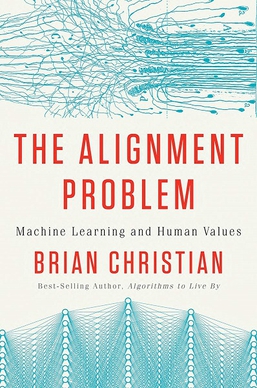
Marvin Lee Minsky was an American cognitive and computer scientist concerned largely with research in artificial intelligence (AI). He co-founded the Massachusetts Institute of Technology's AI laboratory and wrote several texts about AI and philosophy.
The technological singularity—or simply the singularity—is a hypothetical future point in time at which technological growth becomes uncontrollable and irreversible, resulting in unforeseeable consequences for human civilization. According to the most popular version of the singularity hypothesis, I. J. Good's intelligence explosion model of 1965, an upgradable intelligent agent could eventually enter a positive feedback loop of self-improvement cycles, each successive; and more intelligent generation appearing more and more rapidly, causing a rapid increase ("explosion") in intelligence which would ultimately result in a powerful superintelligence, qualitatively far surpassing all human intelligence.
Friendly artificial intelligence is hypothetical artificial general intelligence (AGI) that would have a positive (benign) effect on humanity or at least align with human interests such as fostering the improvement of the human species. It is a part of the ethics of artificial intelligence and is closely related to machine ethics. While machine ethics is concerned with how an artificially intelligent agent should behave, friendly artificial intelligence research is focused on how to practically bring about this behavior and ensuring it is adequately constrained.

Nick Bostrom is a philosopher known for his work on existential risk, the anthropic principle, human enhancement ethics, whole brain emulation, superintelligence risks, and the reversal test. He was the founding director of the now dissolved Future of Humanity Institute at the University of Oxford and is now Principal Researcher at the Macrostrategy Research Initiative.
Artificial general intelligence (AGI) is a type of artificial intelligence (AI) that matches or surpasses human cognitive capabilities across a wide range of cognitive tasks. This contrasts with narrow AI, which is limited to specific tasks. Artificial superintelligence (ASI), on the other hand, refers to AGI that greatly exceeds human cognitive capabilities. AGI is considered one of the definitions of strong AI.
A superintelligence is a hypothetical agent that possesses intelligence surpassing that of the brightest and most gifted human minds. "Superintelligence" may also refer to a property of problem-solving systems whether or not these high-level intellectual competencies are embodied in agents that act in the world. A superintelligence may or may not be created by an intelligence explosion and associated with a technological singularity.
The Machine Intelligence Research Institute (MIRI), formerly the Singularity Institute for Artificial Intelligence (SIAI), is a non-profit research institute focused since 2005 on identifying and managing potential existential risks from artificial general intelligence. MIRI's work has focused on a friendly AI approach to system design and on predicting the rate of technology development.

An AI takeover is an imagined scenario in which artificial intelligence (AI) emerges as the dominant form of intelligence on Earth and computer programs or robots effectively take control of the planet away from the human species, which relies on human intelligence. Possible scenarios include replacement of the entire human workforce due to automation, takeover by an artificial superintelligence (ASI), and the notion of a robot uprising. Stories of AI takeovers have been popular throughout science fiction, but recent advancements have made the threat more real. Some public figures, such as Stephen Hawking and Elon Musk, have advocated research into precautionary measures to ensure future superintelligent machines remain under human control.
In artificial intelligence (AI), commonsense reasoning is a human-like ability to make presumptions about the type and essence of ordinary situations humans encounter every day. These assumptions include judgments about the nature of physical objects, taxonomic properties, and peoples' intentions. A device that exhibits commonsense reasoning might be capable of drawing conclusions that are similar to humans' folk psychology and naive physics.
Melanie Mitchell is an American scientist. She is the Davis Professor of Complexity at the Santa Fe Institute. Her major work has been in the areas of analogical reasoning, complex systems, genetic algorithms and cellular automata, and her publications in those fields are frequently cited.
The AI effect is the discounting of the behavior of an artificial-intelligence program as not "real" intelligence.
In the field of artificial intelligence (AI) design, AI capability control proposals, also referred to as AI confinement, aim to increase our ability to monitor and control the behavior of AI systems, including proposed artificial general intelligences (AGIs), in order to reduce the danger they might pose if misaligned. However, capability control becomes less effective as agents become more intelligent and their ability to exploit flaws in human control systems increases, potentially resulting in an existential risk from AGI. Therefore, the Oxford philosopher Nick Bostrom and others recommend capability control methods only as a supplement to alignment methods.

Roman Vladimirovich Yampolskiy is a Latvian computer scientist at the University of Louisville, mostly known for his work on AI safety and cybersecurity. He holds a PhD from the University at Buffalo (2008). He is the founder and current director of Cyber Security Lab, in the department of Computer Engineering and Computer Science at the Speed School of Engineering of the University of Louisville.

Superintelligence: Paths, Dangers, Strategies is a 2014 book by the philosopher Nick Bostrom. It explores how superintelligence could be created and what its features and motivations might be. It argues that superintelligence, if created, would be difficult to control, and that it could take over the world in order to accomplish its goals. The book also presents strategies to help make superintelligences whose goals benefit humanity. It was particularly influential for raising concerns about existential risk from artificial intelligence.
Existential risk from artificial intelligence refers to the idea that substantial progress in artificial general intelligence (AGI) could lead to human extinction or an irreversible global catastrophe.

The Master Algorithm: How the Quest for the Ultimate Learning Machine Will Remake Our World is a book by Pedro Domingos released in 2015. Domingos wrote the book in order to generate interest from people outside the field.

Life 3.0: Being Human in the Age of Artificial Intelligence is a 2017 non-fiction book by Swedish-American cosmologist Max Tegmark. Life 3.0 discusses artificial intelligence (AI) and its impact on the future of life on Earth and beyond. The book discusses a variety of societal implications, what can be done to maximize the chances of a positive outcome, and potential futures for humanity, technology and combinations thereof.

Human Compatible: Artificial Intelligence and the Problem of Control is a 2019 non-fiction book by computer scientist Stuart J. Russell. It asserts that the risk to humanity from advanced artificial intelligence (AI) is a serious concern despite the uncertainty surrounding future progress in AI. It also proposes an approach to the AI control problem.

Novacene: The Coming Age of Hyperintelligence is a 2019 non-fiction book by scientist and environmentalist James Lovelock. It has been published by Penguin Books/Allen Lane in the UK, and republished by the MIT Press. The book was co-authored by journalist Bryan Appleyard. It predicts that a benevolent eco-friendly artificial superintelligence will someday become the dominant lifeform on the planet and argues humanity is on the brink of a new era: the Novacene.

The Alignment Problem: Machine Learning and Human Values is a 2020 non-fiction book by the American writer Brian Christian. It is based on numerous interviews with experts trying to build artificial intelligence systems, particularly machine learning systems, that are aligned with human values.










